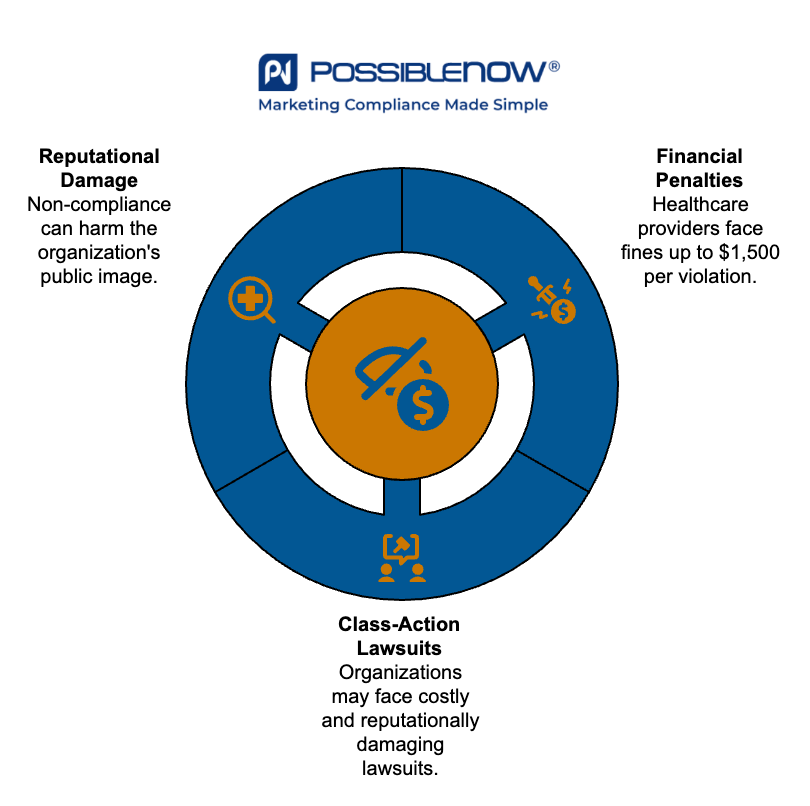Resource Center
Are There TCPA Exemptions for Healthcare Providers?
Type: Blog
Topic: Do Not Call Solution

Yes, there are specific exemptions under the Telephone Consumer Protection Act (TCPA) for healthcare providers. These exemptions primarily apply to calls or text messages that are considered essential to patient care, that could be deemed marketing communications. However, healthcare providers must still comply with certain rules, particularly when it comes to marketing messages and all other calls made to wireless numbers using automated systems.
Given the complexities involved, managing TCPA compliance can be challenging for healthcare providers. PossibleNOW’s Do Not Call platform helps healthcare organizations navigate TCPA regulations, protecting essential patient communications while avoiding costly penalties.
Speak With an Expert Today
How HIPAA Interacts with TCPA Regulations in Healthcare
The Health Insurance Portability and Accountability Act (HIPAA) and the TCPA both govern communications between healthcare providers and patients, but they serve different purposes. HIPAA focuses on protecting patient privacy, while the TCPA regulates telemarketing practices and calls made using automated systems.
When healthcare providers send messages that contain protected health information (PHI), they must comply with both HIPAA and TCPA rules.
HIPAA permits the use of certain patient information for communications related to treatment, payment, and healthcare operations without additional consent, but TCPA still requires prior express consent for calls to wireless numbers for these types of calls/texts, unless they meet certain exemptions.
TCPA Exemptions for Healthcare Marketing Calls
It’s important to note that the TCPA allows for a carve-out for HIPAA covered entities sending marketing calls/texts. While other industries are required to obtain express written consent for marketing calls/texts, HIPAA covered entities are only required to obtain express consent. distinguishes between marketing and informational calls in the healthcare industry. While appointment reminders and prescription refill notices are generally exempt from TCPA rules, marketing calls are not. Marketing communications, such as promoting a new service or product, require prior express written consent from the patient, even if the patient has provided their phone number.
Failure to distinguish between these two types of calls can lead to non-compliance, putting healthcare providers at risk of significant penalties.
Consequences of Non-Compliance with TCPA for Healthcare Providers

Non-compliance with TCPA regulations can result in steep penalties for healthcare providers, with fines reaching up to $1,500 per violation for willful breaches.
Additionally, TCPA violations often lead to class-action lawsuits, which can be both financially and reputationally damaging for healthcare organizations. As the healthcare industry becomes more reliant on digital communications, staying compliant with both TCPA and HIPAA is crucial to avoid these costly consequences.
Best Practices for Healthcare Providers to Stay TCPA Compliant
To minimize the risk of TCPA violations, healthcare providers should:
- Obtain prior express consent: Make sure you have documented consent from patients before contacting them through automated systems, particularly for marketing communications.
- Differentiate between marketing and informational messages: Always make a clear distinction between purely informational calls and those that contain marketing content.
- Use compliance tools: Leverage tools like PossibleNOW’s DNCSolution to automate consent tracking.
By adopting these practices, healthcare providers can continue to communicate effectively with patients while remaining compliant with TCPA regulations.
Request a Demo Today
About PossibleNOW
PossibleNOW is the pioneer and leader in customer consent, preference, and regulatory compliance solutions. We leverage our MyPreferences technology, processes, and services to enable relevant, trusted, and compliant customer interactions. Our platform empowers the collection, centralization, and distribution of customer communication consent and preferences across the
enterprise. DNCSolution addresses Do Not Contact regulations such as TCPA, CAN-SPAM and CASL, allowing companies to adhere to DNC requirements, backed by our 100% compliance guarantee.
PossibleNOW’s strategic consultants take a holistic approach, leveraging years of experience when creating strategic roadmaps, planning technology deployments, and designing customer interfaces. PossibleNOW is purpose-built to help large, complex organizations improve customer experiences and loyalty while mitigating compliance risk.
-
TCPA Regulations and Compliance: Complete Guide
Type: Blog
Topic: Do Not Call Solution
-
Defining Meaningful Metrics: 6 Soft KPIs to Measure Customer Preference Collection
Type: Blog
Topic: Preference Mgmt
-
Email Preference Center Best Practices
Type: Blog
Topic: Preference Mgmt
-
The Basics of DNC Scrubbing: What Is a Do Not Call (DNC) Scrubber and Why Do You Need It?
Type: Blog
Topic: Do Not Call Solution
-
What is Consent Management, How it Works, & Why it’s Important for Data Compliance
Type: Blog
Topic: Consent Mgmt
-
Do Insurance Companies Cover TCPA Damages?
Type: Blog
Topic: Do Not Call Solution
-
8 Best Practices for Capturing GDPR Consent
Type: Webinars
-
Data Silos Cause Communication Gaps
Type: Videos
Topic: Preference Mgmt
-
Difference Between Preferences & Consent
Type: Videos
Topic: Preference Mgmt
-
Integrate Do Not Call Compliance with Preferences
Type: Videos
Topic: Preference Mgmt
-
Customer Preferences Require More Than One Flavor
Type: Videos
Topic: Preference Mgmt
-
Give Customers Opt-Down Options
Type: Videos
Topic: Preference Mgmt
-
Preference Center Organization
Type: Videos
Topic: Preference Mgmt
-
Strategic Consultants Benefited Scotiabank
Type: Videos
Topic: Industry Testimonials
-
My Call Center is Not in the US. Do I Need to Comply with US Telemarketing Regulations?
Type: Blog
Topic: Do Not Call Solution
-
How Many TCPA Violations Do I Have to Commit to Be Sued?
Type: Blog
Topic: Do Not Call Solution
-
How Does My Business Obtain a SAN Number to Access the DNC Registry?
Type: Blog
Topic: Do Not Call Solution
